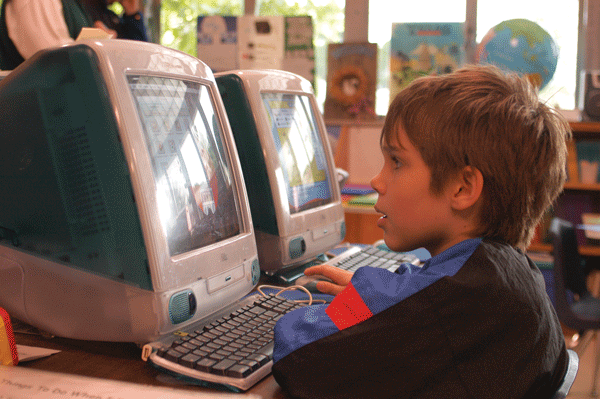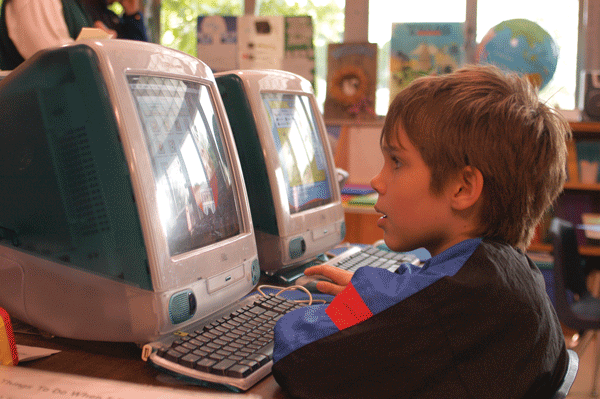
BY SEAN EGAN | There is, quite literally, nothing like writer/director Richard Linklater’s latest feature. The conceit is simple — the film follows the life of Mason Jr., a young boy from a broken home, as he grows into a young man in Texas. Within this framework, though, lies a quiet tour de force of innovative production and storytelling techniques — an intimate epic that muses on what it means to mature and discover who you are.
It’s impossible to discuss “Boyhood” without first considering its unprecedented production. In order to show the development of its main character, Linklater shot the movie over a period of 12 years, allowing him to grow up on screen. Texas native Ellar Coltrane played Mason from age six onward, filming scenes that trace his journey from elementary school student to college freshman.
Linklater’s 12-year experiment is an emotionally satisfying masterpiece
Growth and development permeates all other aspects of the movie, as the world slowly shifts from landlines to iPhones. Right from the outset, the film whisks viewers back to the not-too-distant past by using period-appropriate pop songs (the strains of Coldplay’s “Yellow” are put to particularly good use in the opening moments), while characters reference current politics and fads (the War on Terror and Britney Spears, to name a couple). Though it’s a kick to get glimpses of politics and pop culture from the past decade, Linklater avoids nostalgia just for the sake of it — instead, allowing the film’s in-the-moment reflections on the cultural climate to invoke realism and universality.
The success of “Boyhood,” however, is not contingent on the novelty of its production, but on the story Linklater and company chose to tell. Since his iconic 1991 feature, “Slacker,” Linklater has consistently subverted traditional narratives in order to tinker with more challenging, experimental structures. “Boyhood” may be his greatest use of this method to date. While it fits snugly in the “coming of age” genre, it is anything but ordinary. Eschewing clichéd milestones of youth, Linklater focuses on the day-to-day minutiae of growing up and small snapshots of highly particular moments in time. These vignettes never give the film much narrative thrust, but they all inform one another, creating a larger mosaic of Mason’s young life, showing how his experiences shaped him into the intelligent young man he becomes.
FILM | BOYHOOD Written & Directed by Richard Linklater 165 minutes At the IFC Center 323 Ave. of the Americas Btw. W. Third & Fourth Sts. Info: 212-924-7771 or ifccenter.com
The cumulative effect is akin to having an introspective browse through a family photo album, reminiscing on formative influences and experiences to better understand oneself. The film vividly captures the confusion and motivations of childhood, while tempering it with the benefit of adult hindsight and understanding.
The principle cast is excellent at grounding the movie. Every character is fully realized, and each actor digs into their increasingly nuanced relationships and internal lives as the movie marches on. Patricia Arquette brings depth and a deft touch to the role of Olivia, Mason’s divorced mother. Her character’s efforts to improve her family’s lives provides the film with some of the most emotionally vulnerable and affecting moments. Ethan Hawke, a Linklater regular, plays Mason Sr. as a flawed yet loving father, and gives the movie a lot of heart and energy. Lorelei Linklater (the filmmaker’s daughter) as Sam, Mason’s older sister, is an effective female counterpoint to Mason (far more talkative than her brother, her rapier wit the yields some big laughs).
Collectively, they are totally believable as a family, and help to expand the scope of the film — allowing it to examine parent/child dynamics, sibling relationships, the effects of divorce, and more. Yet the show ultimately belongs to Coltrane’s Mason. Through serendipity, the young boy of the opening reel grows into a highly capable actor, and his transformation from wide-eyed child to an intelligent young man with a burgeoning interest in art is amazing to watch. Coltrane’s low-key charm and charisma help make Mason an engaging character to follow, and his performance is one of the most emotionally complex depictions of a teenager on screen — all grand ideas, yet frustratingly inarticulate.
And though “Boyhood” is ambitious in concept and execution, it plays like classic Linklater through and through. His dialogue, as always, feels real and naturalistic — even when the characters begin to wax philosophic, it retains its well-observed, colloquial Texan flavor. His direction is unobtrusive, but elegant. High and low angle shots are repeatedly used to place the audience in the mind of both parent and child, and show how their relationships shift with time. Elsewhere, Linklater’s signature walk-and-talk tracking shots, a mainstay of his “Before” trilogy, find a welcome home. Throughout it all, Linklater and cinematographers Lee Daniel (a longtime collaborator) and Shane F. Kelly find the beauty in the film’s lived-in locations, suburban idyl, and sprawling Texas landscapes. The care put into every aspect of the production gives the film a genuine sense of warmth and compassion, drawing you into its world and allowing the audience to appreciate every moment (the sizable running time breezes by).
It is, in short, something of a culmination of Linklater’s work to date — a capstone of sorts for one of America’s best, most overlooked directors. It’s a masterpiece, sure, but it never announces itself as such. On paper and in theory, the film is a truly monumental achievement, but its greatest feat is how personal and small-scale the film feels. While it has the swollen running time and heady themes more familiar to biblical and historical epics, it never becomes overblown or pretentious — in fact, the film is as unassuming and charming as Mason becomes through the years. This accessibility is key to the movie’s greatness. Whether one’s childhood and teenage years are in the distant past, or fresh in the mind, “Boyhood” is a relatable, beautiful, and emotionally satisfying whole.































